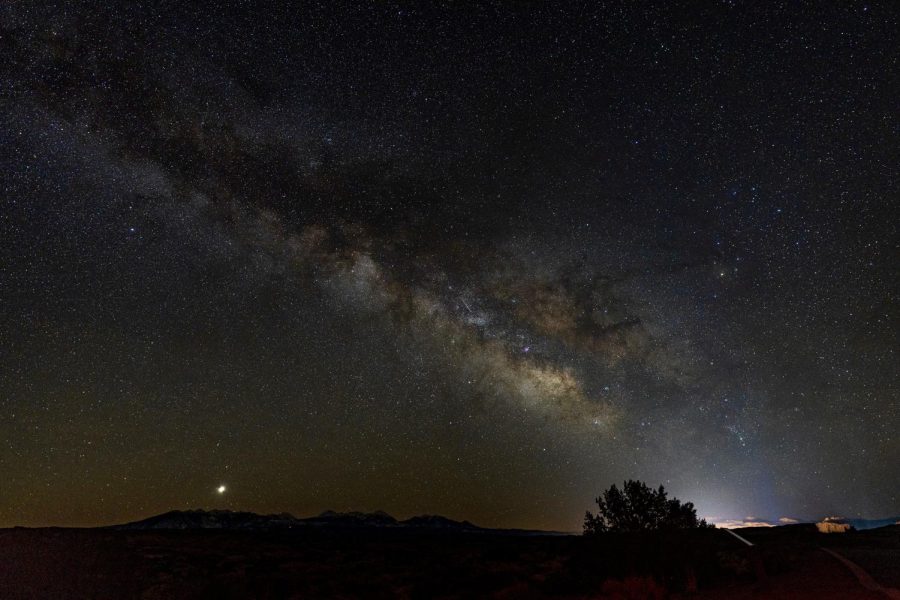Shadley: Protect Dark Skies
The Milky Way at Arches National Park in Moab, Utah on March 10, 2022. (Photo by Xiangyao “Axe” Tang | The Daily Utah Chronicle)
April 17, 2022
I’ve lived in cities my whole life. In cities, when the sun goes down, the night sky is replaced by the glow of street lights, late-night drives and overtime shifts. More than just never sleeping, the city never closes its eyes. And when we look up at the night sky, there’s nothing to see.
Light pollution from cities permanently blocks the view of the Milky Way for 80% of Americans. As our cities become more populated, that light pollution spills further out into suburban and rural areas. With nearly 99% of Americans living under some “sky glow,” it’s increasingly difficult to find places in the U.S. untouched by artificial light. But a few of them still exist here in Utah.
While not the darkest place in Utah, Capitol Reef National Park’s night sky remains “remarkably close” to what it looked like before artificial light. Classified as an International Dark Sky Park, there’s mounting pressure to prevent light pollution from spoiling these pristine night skies. Without action, some stars may no longer be visible from anywhere in the U.S.
To properly write this piece, I went to Capitol Reef and experienced a dark sky for myself. I invited the Chrony’s photo chief, Gwen Christopherson, to join me because we’d previously worked together on a photo-centered story about the Great Salt Lake. And, well, you can’t publish an article about dark skies without any astrophotography. So, we waited for a new moon and headed to Capitol Reef for a night.
Capitol Reef’s night skies offer more than just an excellent opportunity for humans to view the stars. Without much artificial light, these dark, wild spaces serve as a refuge for nocturnal animals and the ecosystems they support. Light pollution can disrupt ecosystems by shifting conditions for both predators and prey. The cover of darkness allows prey animals to sleep, find food or reproduce without risking their lives. When artificial light makes them visible to predators, it can affect their population sizes. That change can cause ripple effects throughout the ecosystem. Migratory birds rely on the night skies to reach their destination and accurately time their travels. Preventing light pollution is more than just a desire for superb stargazing, it’s critical to the health of our ecosystems and the species we share this planet with.
Gwen and I rolled into our dispersed camping spot around 11 p.m. We set up our tents, ate a little food and prepared to take some pictures of the night sky. I’d never seen so many stars. A lifetime of city nights left me unable to make sense of these gleaming bodies that danced across the sky. The only constellation I could name was the Big Dipper. Or was that the Little?
I felt small. Insignificant. That’s how I feel in a big city. Where you know that even if you didn’t exist, the I-5 would still be backed up, your favorite taco truck would stay in business and someone else would write stories about dark skies. Cities remind us that individuals don’t make society function, communities do. But out there beneath all those stars, it wasn’t just my individual significance that I questioned, but our significance as a species. Without us here, there’d be no one to emit carbon into the atmosphere or deplete every species that has some semblance of economic value. If the lights were to go out, life on earth would go on. Largely for the better.
We were all set up to take some pictures, but there was just one small problem. We’d forgotten an SD card. With all the stores closed until morning, we quickly accepted this trip’s lack of astrophotography. But the funny thing about cameras is that even without an SD card, you can still take a picture. It just disappears after a second or two. So, I sat there, looking at more of the universe, knowing none of these moments would be saved.
Desert ecosystems, rainforests, coral reefs and the night sky are like pictures that we don’t have an SD card for. We can’t just press a button and keep them in their current state forever. If we want to protect these beautiful ecosystems for the future, we must make changes to how we’re living today. We must recognize that this planet belongs to more species than just us and adjust our consumption of its resources to a level that reflects that reality. One insignificant species must take significant steps to fix the problems that some of us have created. We must protect the dark skies that remind us of our vast insignificance.








